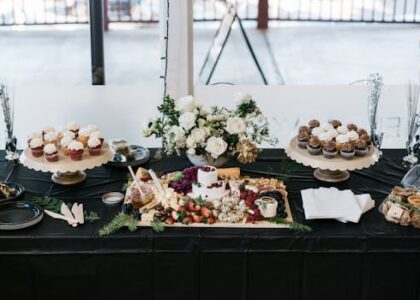Factors affecting planning time: budget, guest list, venue availability
Understanding how budget constraints, guest list dynamics, and venue availability impact wedding planning.
- Budget dictates every aspect of your wedding planning. A limited budget can lead to tough choices between essentials and nice-to-haves, ultimately affecting the timeline as you seek alternatives that fit your financial parameters.
- The guest list is a living document that continually evolves. As relationships change and family dynamics shift, the guest list can take shape slowly, leading to delays in decisions for catering and seating arrangements that hinge on final numbers.
- Venue availability can significantly hinder your timeline. Popular wedding locations often book out well in advance, which means your choice of date or even season may change, forcing adjustments to your plans or leading to compromises that may not align with your vision.
Choosing the Right Wedding Planner
Selecting a wedding planner can make or break your big day.This choice shouldn’t be taken lightly. Start by assessing their portfolio. Look for planners who have previously executed weddings that resonate with your vision. If you adore rustic themes, a planner specialized in modern city weddings might not be the best fit. Meet with potential planners to gauge chemistry; you’ll be collaborating closely, so it’s essential to feel comfortable with them. Ask about their planning process, problem-resolution strategies, and availability on your wedding date.Consider their network. A well-connected planner can secure better deals on venues, catering, and other services. Inquire about their relationships with vendors—strong partnerships often lead to higher quality service. Budget is crucial too; ensure they can work within your financial parameters without sacrificing quality. Read reviews and seek references from previous clients. This feedback can provide valuable insights into their reliability and the overall experience. A planner’s ability to handle stress and unexpected challenges is key in ensuring your day runs smoothly. Ultimately, trust your instincts; find someone whose style aligns with yours, and who genuinely understands your vision and dreams for the day.
Jul 7, 2014 …Planning a high end wedding can take between 600 and 1,000 hours. … Food is the new fashion, and for a generation that spends as much time …
Top 5 Luxury Wedding Trends to Consider
Luxury weddings are evolving with exciting new trends that elevate the overall experience. Here are five standout trends I’ve noticed that can transform any wedding into a lavish event.
- Bespoke Experiences: From personalized vows written by a professional to custom cocktails crafted for your guests, bespoke experiences are a hit. Each detail reflects the couple’s story, creating an unforgettable atmosphere.
- Sustainable Luxury: Couples are increasingly opting for eco-friendly choices without sacrificing opulence. Think elegant recycled paper invitations, locally sourced food, and decor made from biodegradable materials.
- Intimate Celebrations: Smaller weddings allow for an upscale experience. With fewer guests, you can splurge on lavish catering, exquisite floral arrangements, and high-end venues that might be out of reach for larger gatherings.
- Experiential Decor: Transformative designs, such as immersive experiences with interactive art installations or themed rooms, ensure your wedding is not only visually stunning but also engaging for guests.
- Gourmet Food Stations: Gone are the days of traditional sit-down meals. Unique stations like sushi bars or dessert lounges elevate the dining experience, providing guests with customizable options that are both delicious and memorable.
The Role of Vendor Coordination
Vendor coordination is crucial for the success of any wedding. With numerous details to juggle, having everyone on the same page prevents mishaps. I’ve learned that establishing a clear line of communication with each vendor is vital. This means being upfront about expectations, timelines, and specific requirements. I make it a point to have an initial meeting with all vendors to discuss their roles and how they fit into the overall vision of the wedding.
One key aspect I’ve discovered is to create a shared timeline. This timeline should outline when each vendor is expected to deliver their goods or services. Without this roadmap, chaos can ensue on the wedding day. For instance, if the florist arrives late and the venue is not ready for the decor setup, it can throw the entire schedule off. I find that sending reminders leading up to the event helps keep everyone accountable.
Collaboration between vendors often yields the best results. I make it a point to facilitate conversations between my florist and my photographer, for example, to ensure that the floral arrangements complement the overall aesthetic captured in the photos. Encouraging dialogue between vendors not only clarifies details but also sparks creativity.
Lastly, always have a backup plan. Vendors can face unexpected issues, be it a delivery mishap or a scheduling conflict. I’ve seen first-hand how essential it is to have alternative arrangements ready, especially for critical components like catering or entertainment.
Conclusion: The Importance of Early Planning
Planning your wedding early can make all the difference. As someone who has experienced the whirlwind of wedding preparations, I can attest to the immense relief that comes from starting the planning process well in advance. By prioritizing early planning, you set the tone for a more enjoyable and less stressful experience. This affords you the time to explore options like wedding venues, catering services, and floral arrangements instead of rushing through decisions out of necessity.
Early planning also allows you to stay atop the latest trends in wedding decor and bridal accessories, ensuring you have access to the most sought-after items. The last thing you want is to find your dream invitation firm already booked or a fabulous venue that’s unavailable because you waited too long. Additionally, with a longer planning timeline, you can compare prices and potentially score better deals, which can significantly reduce overall costs.
Moreover, early planning provides breathing room for adjustments. As unforeseen situations arise—like family dynamics or vendor challenges—you’ll appreciate having the flexibility to make changes. Ultimately, setting aside time for early planning is an investment in your peace of mind and the overall success of your wedding. You’ll be able to truly enjoy the engagement period, focusing on the excitement of the upcoming day rather than on a lengthy to-do list.
The Wedding Planning Timeline: An Overview
Understanding the wedding planning timeline is crucial for a successful celebration. I believe starting your planning at least 12 months in advance is ideal. This gives you ample time to consider all elements without feeling rushed. Here’s a detailed breakdown of the essential milestones:
12+ Months Before: This is your initial phase. Prioritize setting a budget, choosing a wedding date, and creating a guest list. It’s also the time to find a venue. The popular spots get booked quickly, so act fast!
9-11 Months Before: Now, it’s time to book your vendors, including catering, photography, and entertainment. Also, start looking for a wedding dress, as alterations can take time. I can’t stress enough how a well-chosen dress can enhance the entire aesthetic of your wedding.
6-8 Months Before: Focus on invitations. Choose a design that reflects your theme and book them early to allow for mailing. This period is also ideal for planning the ceremony specifics, like vows and readings.
3-5 Months Before: Finalize your guest list, send out invitations, and RSVP tracking begins. Use this time to explore wedding favors and bridal accessories that add a personal touch to your event.
1-2 Months Before: This phase is all about final checks. Confirm details with vendors. Create a wedding day schedule. If you’re like me, having a timeline will help you stay cool and collected as the big day approaches.
1-2 Weeks Before: It’s time for the final walkthrough of the venue, confirming seating arrangements, and preparing for any last-minute adjustments.
Ultimately, following a structured timeline can greatly reduce stress and increase the joy of planning your special day. Each milestone plays a crucial role in ensuring everything goes as envisioned.
Jun 16, 2023 … An especially beautiful wedding might be featured on the site, or picked up by The Knot's magazine. Soon more and more people began planning …
Congrats to the sweetest couple K+D! by @laurenlouisecollective Planning & Floral Design by us / @eleganceandsimplicityinc Venue – @thelinehotel in DC # …
Jan 29, 2024 … … get into the bulk of the planning, there isn't any animosity. … How far into your wedding planning are you? I had felt the same way …
Dec 5, 2023 … … planning requires a whole lot more than just picking pretty flowers and a dress or suit. Your wedding planner juggles all the roles and takes …
Do You Really Need A Wedding Planner? — Josie Brooks – Florida …
May 15, 2024 … I am in the very beginning stages of wedding planning and wanted to see if anyone had any recommendation on a FULL SERVICE wedding planner, preferably located …
Jul 7, 2014 …Planning a high end wedding can take between 600 and 1,000 hours. … Food is the new fashion, and for a generation that spends as much time …
Checklist: Essential Wedding Planning Tasks
This checklist outlines the critical tasks to execute for a successful wedding, ensuring you don’t miss a beat.
- Set a wedding date and time.
- Establish a budget that covers all essential aspects.
- Compile a guest list to determine venue size.
- Choose and book your ceremony and reception venues.
- Select your wedding party and inform them of their roles.
- Hire a wedding planner, if necessary, for extra support.
- Choose a theme or color palette that resonates with your vision.
- Book essential vendors such as a photographer, caterer, and florist.
- Send out save-the-dates to guests, especially if it’s a destination wedding.
- Design and order invitations that reflect your theme.
- Plan the ceremony structure, including readings and music.
- Organize transportation for you and your guests.
- Arrange accommodations for out-of-town guests.
- Confirm and conduct tastings with your caterer.
- Finalize the schedule for the wedding day.
- Prepare a contingency plan for unexpected situations.
- Plan and create your wedding registry.
- Take care of marriage license requirements ahead of time.
Essential Milestones in Luxury Wedding Planning
Creating a luxury wedding requires careful planning and attention to detail. The journey often begins with establishing a budget that reflects the level of opulence desired. It’s essential to prioritize elements that will enhance the celebration, whether that be the venue, catering, or floral arrangements. Booking a prestigious venue early on is crucial, as sought-after locations can sell out months in advance. After securing the venue, the next step is choosing a wedding planner who specializes in luxury events. This person will bring invaluable expertise in coordinating high-end vendors and ensuring that every detail aligns with your vision.
Selecting a theme is another significant milestone. This theme guides the design of everything from invitations to table settings. Once the theme is established, consider crafting exquisite invitations that reflect the tone of your event—these set the stage for the entire experience.
A well-curated guest list is also vital; invite those that you truly want to celebrate with. After finalizing the guest list, it’s time to focus on taste testing for the menu and choosing an exceptional caterer known for exquisite cuisine. Don’t overlook the importance of entertainment; booking high-caliber musicians or DJs can elevate the atmosphere to unforgettable levels.
As the wedding day approaches, finalizing details such as décor and attire becomes essential. The wedding dress and bridesmaid dresses should reflect the elegance of your vision, and selecting accessories can enhance your look dramatically. Lastly, planning for the honeymoon should not be an afterthought; it’s an integral piece of celebrating your new life together.
Tips for Streamlining the Planning Process
Establish a clear timeline as early as possible and stick to it. Having a detailed schedule for each phase of planning allows you to manage your time effectively and reduces the risk of last-minute chaos. Break tasks into manageable segments. Instead of trying to tackle everything at once, focus on one task at a time—like securing a venue or selecting your wedding cake. Utilize technology to keep everything organized. Use apps or spreadsheets to track RSVPs, vendors, and budgets. I swear by my wedding planning apps that remind me of crucial deadlines. Prioritize tasks based on urgency and importance. Identify which elements of your wedding are critical and which can be postponed. This helps you focus your energy where it counts the most. Delegate responsibilities to trusted family and friends. Don’t hesitate to involve others in the planning process. Assign specific tasks, whether it’s décor, invitations, or coordinating with vendors. Stay flexible. Unexpected hiccups are bound to happen. Being adaptable can save stress; a change in the schedule doesn’t mean your wedding won’t be beautiful. Communicate openly with your partner. Regular discussions about your visions, budget concerns, and responsibilities keep both of you aligned and reduce misunderstandings. Limit the number of options you consider. Too many choices can lead to indecision, so narrow down your options for venues, flowers, or colors before making final selections.
Common services to book early: catering, photography, florists
Booking these essential services early can significantly affect your wedding’s success and vibe.
- Catering: The menu can set the tone for your entire wedding. Popular caterers often get booked months, or even a year, in advance. I highly recommend locking them in as soon as you’ve finalized your guest list. This ensures you get the flavors and presentation you desire, rather than settling for what’s available.
- Photography: Your wedding photos are lasting memories that deserve the best. Talented photographers usually have a packed schedule, especially during peak wedding seasons. I remember vividly how vital it was for me to meet with potential photographers to see their portfolios early on. Opt for someone whose style resonates with you to capture those irreplaceable moments beautifully.
- Florists: The floral arrangements can truly transform your wedding space. Seasonality plays a major role, too. It’s essential to connect with florists early to discuss ideas that match your vision. I found that the best florists are not only booked out, but they also need time to source specific flowers, especially if you have a unique color palette or theme.
Key Factors Influencing Planning Duration
One of the major factors impacting how long wedding planning takes is the couple’s availability. Balancing work, personal commitments, and wedding tasks can lead to delays if schedules don’t align. The complexity of the wedding vision directly influences planning time. If you desire a large, intricate event with multiple components, expect the planning to stretch out as you coordinate vendors, timelines, and logistics. Your choice of venue significantly contributes to planning duration. Popular venues often book out a year or more in advance, and that creates a ripple effect in your planning schedule, pushing timelines back. The level of experience and organization among the planning team can either expedite or prolong the process. If you are working with seasoned professionals, they’ll likely streamline many aspects. Decisions about guest count can also extend planning time. A larger guest list requires more meticulous planning regarding seating, catering, and accommodations. The availability and reliability of vendors can greatly affect timelines. Delays from florists, photographers, and caterers during the booking or confirmation process can add considerable time to your planning. Your budget restrictions will dictate a lot of logistics. If you’re trying to work within a tight budget, it often requires more research and negotiations, leading to an extended planning period. Finally, emotional factors play a role, as stressful moments may slow your decision-making ability. Recognizing these influences can simplify the process and help maintain momentum.
Common Pitfalls to Avoid in Wedding Planning
Failing to set a realistic budget is a rookie mistake that could lead to a stressful experience. Many couples underestimate costs, leading to disappointment or unexpected financial strain. Knowing your limits upfront helps guide your choices for everything from the venue to the favors.
Ignoring the importance of a wedding planner can be detrimental. While not necessary for all couples, a skilled planner can simplify the process significantly. Their industry knowledge and connections can save you both time and money.
Another grave error is not prioritizing your must-haves. Make a list of the elements that matter most to you and your partner. If the flowers are your centerpiece, allocate more of your budget to that area while being flexible with less critical aspects.
Underestimating the time required for bookings and arrangements is also a frequent pitfall. Vendors, especially popular ones, get booked well in advance. Start reaching out early to secure your preferred choices.
Failing to communicate effectively with your partner can cause unnecessary tensions. Regular discussions about expectations, preferences, and decisions ensure both partners are on the same page, leading to a more harmonious planning experience.
Lastly, neglecting the timeline can create chaos. A well-structured timeline keeps the planning process on track and minimizes last-minute stressors. Map out deadlines for each component to ensure nothing falls through the cracks.
As an Amazon Services LLC Associates Program participant, we earn advertising fees by linking to Amazon, at no extra cost to you.
How far in advance should we start planning a luxury wedding?
For a luxury wedding, I recommend starting the planning process at least 12 to 18 months in advance. This timeframe allows ample opportunity to secure high-demand vendors like top-tier venues, renowned caterers, and sought-after photographers. Many exclusive wedding vendors book up quickly, often a year or more in advance, especially for popular wedding dates. Don’t underestimate the time required for detailed decisions, such as floral arrangements, custom decor, and personalized services that elevate the experience. Furthermore, having this lead time gives you the flexibility to make changes without pressure. You can also take advantage of seasonal sales for invitations, bridal accessories, and other wedding essentials if you plan early. Luxury weddings demand meticulous attention to details, and the more time you grant for planning, the better your chances of creating a truly remarkable event.
What are the most time-consuming aspects of wedding planning?
Guest list management can take an immense amount of time. Coordinating who is invited, tracking RSVPs, and dealing with plus-ones often feels like a never-ending task. Choosing a venue is another major time sink. Not only are you looking at availability and pricing, but also the style and capacity that fits your vision. Additional indecision about decor can stretch your planning process. Finding the right vendors is equally labor-intensive. When you’re comparing catering, photography, and entertainment, the options can overwhelm. Finally, the timeline itself demands constant attention and adjustments. Crafting a detailed itinerary to ensure everything runs smoothly is crucial and often takes extensive back-and-forth communication. Each of these elements adds layers of complexity, making wedding planning a more time-consuming endeavor than most expect.
Can I plan a luxury wedding in less than a year?
Absolutely, you can plan a luxury wedding in less than a year. I’ve seen couples successfully pull off stunning events in just a few months. The key is to prioritize and stay organized. Start by setting a realistic budget and choosing your wedding date. Next, select a venue that can accommodate your vision and timeline. Many luxury venues have preferred vendor lists that expedite the planning process.
Make decisions swiftly and be ready to communicate your vision clearly to vendors so they can execute your plans flawlessly. Don’t forget to leverage technology; wedding planning apps can keep everything on track. With creativity and a bit of determination, creating a luxurious experience is entirely achievable in under a year. Your dream wedding awaits!
What should I prioritize when planning my wedding?
First, set your budget. It’s essential to know what you’re willing to spend before making decisions. Next, focus on the guest list; the number of guests will directly impact your venue and catering costs. Choosing the right venue comes next; it sets the tone for your entire day. Decide on your wedding date early, as it influences vendor availability and pricing. Don’t overlook your vendors; secure reliable ones for photography, catering, and music. Finally, plan your wedding timeline carefully; a well-structured schedule keeps everything on track. Prioritizing these elements will ease the planning process and help you create the wedding of your dreams.
What common mistakes should I avoid during the planning process?
Underestimating your budget is a crucial mistake. It’s easy to overlook costs for small items that add up quickly. Make a detailed list of all potential expenses. Failing to communicate with your partner can lead to conflicts. Make decisions together to avoid last-minute stress. Ignoring the timeline is another common error. Start planning early; don’t leave important details until the last minute. Overcomplicating your guest list can create unnecessary tension. Keep your list manageable to focus on those who truly matter. Finally, don’t forget to have fun! The planning process should be enjoyable, not just a checklist of tasks.
How can I find a reputable wedding planner?
Start by asking for recommendations from friends and family. If they had a great experience, there’s a good chance you will too. Check online reviews and testimonials. Websites like WeddingWire or The Knot provide insights into planners’ credibility. Next, look for planners with established portfolios. Their past work will give you a clear indication of their style and expertise. Don’t forget to interview potential planners. Ask about their experience, approach to planning, and how they deal with unforeseen issues. A good planner should not only be professional but also aligned with your vision. Discuss budgets upfront. A reputable planner will be transparent about costs and help you maximize your budget. Finally, trust your instincts. If you don’t feel a connection, move on to find someone who truly resonates with your style and needs.
Planning a luxury wedding typically demands 12-18 months of dedicated effort. This timeframe allows for securing top vendors, customizing intricate details, and ensuring every element is perfect.
A clear budget cuts down on planning time. With a defined financial framework, I can prioritize spending, make quicker decisions, and eliminate options that don’t fit. This focus transforms a daunting task into a manageable process.
Hiring a wedding planner frees me from constant decision-making. They manage details, timelines, and vendor communications, enhancing my focus on enjoying the experience.
Vendor relationships are essential for timely planning. Cultivating strong partnerships with suppliers ensures smooth communication, quicker response times, and reliable service, all crucial for executing your wedding vision without delays.
I believe prioritizing your must-have elements is essential. It not only simplifies choices but also ensures that you focus on what truly matters for your wedding.
Consistently checking your timeline ensures that every detail is accounted for. It prevents last-minute rushes and guarantees you’re progressing toward your vision without unnecessary stress.
**Having flexible wedding dates significantly increases your chances of quickly securing venues and vendors.** Popular dates book fast, while off-peak options yield better availability and price advantages.
A detailed guest list is crucial. It helps you decide on venue size, catering needs, and design choices. Knowing your guests informs everything from invitation styles to seating arrangements, ensuring a smoother planning process.
As an Amazon Services LLC Associates Program participant, we earn advertising fees by linking to Amazon, at no extra cost to you.

I’m Marta, a passionate wedding specialist with over 25 years of experience in the wedding and party planning business.









